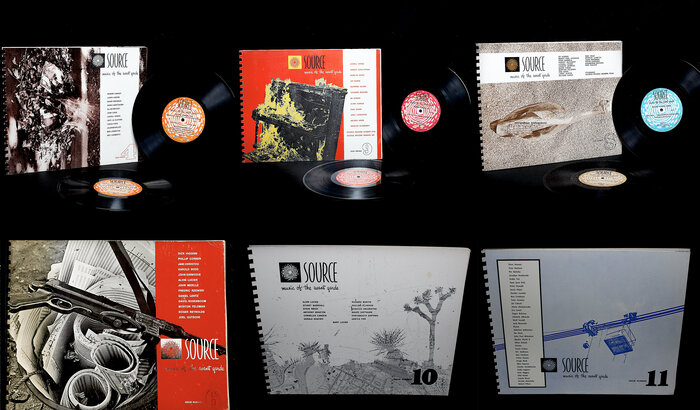Back to Category-Overview
Back to Category-Search
 0
0
Back to Category-Search
Source: Music of the Avant Garde
Year:
Country: United States
Format: Mag/Lit
Description:
Music of the Avant-garde was and remains a seminal source for materials on the heyday of experimental music and arts. Conceived in 1966 and published to 1973, it included some of the most important composers and artists of the time: John Cage, Harry Partch, David Tudor, Morton Feldman, Robert Ashley, Pauline Oliveros, Dick Higgins, Nam June Paik, Steve Reich, and many others. A pathbreaking publication, Source documented crucial changes in performance practice and live electronics, computer music, notation and event scores, theater and installations, intermedia and technology, politics and the social roles of composers and performers, and innovations in the sound of music.
Source: Music of the Avant-Garde – also known and hereafter referred to as Source Magazine – was an independent, not-for-profit musical and artistic magazine published between 1967 and 1973 by teachers and students of the University of California, Davis, California. It emerged from the flourishing Californian musical experimentalism of the late 1950s-early 1960s, at UC-Davis and Mills College. The 11 issues document new music practices of the period like indeterminacy, performance, graphic scores, electronic music and intermedia arts.
Origin
Source Magazine's board of editors first met in the New Music Ensemble, formed in 1963, an improvised music group led by UC-Davis music teacher Larry Austin and comprising two of his students: Stanley Lunetta on drums and Dary John Mizelle on trombone, in addition to Wayne Johnson, bass clarinet ; Art Woodbury, saxophone ; and Richard Swift, keyboards, sometimes augmented by occasional visitors like flutist Jon Gibson or soprano Billie Alexander.
In the Spring of 1966, the group officially launched the Composer/Performer Edition imprint with the idea of publishing a catalog of graphic scores and avantgarde music related material by composers they felt close to, like Frederic Rzewski, Cornelius Cardew, Allan Bryant, or Jon Phetteplace of Musica Elettronica Viva. In 1966, they sent a mailing of 5,000 invitations nationwide, calling for pieces in the form of original scores. Composer/Performer Edition published some of these music scores separately, but the team felt the need to collect the material they received in the form of a magazine titled Source. Austin, Lunetta, Mizelle, Johnson, Woodburry and administrative manager Paul Roberts formed the magazine's board, with Austin becoming chief editor.
A twelfth issue was planned but never made it to printing due to lack of internal funding.
Circulation
Each issue had a print run of 2,000 copies, although the first issue originally ran 1,000 copies before selling out and warranting an additional 1,000 copies. According to chief editor Larry Austin, the spiral-bound, 10 3⁄4 x 13 1⁄2 inches landscape format was inspired by some of John Cage's graphic scores as well as the benefit of being able to stand the magazine up on a piano or music stand when performing pieces. Subscribers were composers, teachers, performers or libraries located in North America and Europe. The magazine was never subsidized or funded by any institution
Music content
Despite or thanks to its short existence, the scope of Source magazine appears both focused and wide-ranging. Emerging from a rejection of formal concert performance and traditional music notation, Source also included performance art and sound poetry in its coverage of avantgarde graphic scores, therefore expanding the very definition of music. It welcomed veterans like Harry Partch, Lukas Foss, John Cage or Morton Feldman, as well as young Turks of the avant-garde like Hugh Davies (b1943), Daniel Lentz (b1942) or Jerry Hunt (b1943).
Over the years, Source covered West Coast experimentalism of the 1960s (Gordon Mumma, Robert Ashley) ; American Minimalism (Steve Reich, Christian Wolff, Earle Brown) ; the birth of Sound Art as we know it (Alvin Lucier, Max Neuhaus, Annea Lockwood) ; improvised and indeterminate music (the ONCE Group, Musica Elettronica Viva, Toshi Ichiyanagi) ; Fluxus and performance art with Dick Higgins or Allan Kaprow ; European sound poetry with the Fylkingen affiliated artists or Bernard Heidsieck ; the British Systems music of Cornelius Cardew, Howard Skempton, Michael Parsons and Gavin Bryars.
Source also welcomed the use of advanced technology (electronic, video, communications) to expand music's scope. The magazine published information on Don Buchla's newly built synthesizer,[10] Nam June Paik's first video experiments or Lowell Cross's video/laser light shows featured in issue #9, 1971. The trend was perfectly in synch with the Art & Technology show at Los Angeles County Museum of Art, 1971, where contemporary artists were offered to partner with engineers and technicians of their choice
Origin
Source Magazine's board of editors first met in the New Music Ensemble, formed in 1963, an improvised music group led by UC-Davis music teacher Larry Austin and comprising two of his students: Stanley Lunetta on drums and Dary John Mizelle on trombone, in addition to Wayne Johnson, bass clarinet ; Art Woodbury, saxophone ; and Richard Swift, keyboards, sometimes augmented by occasional visitors like flutist Jon Gibson or soprano Billie Alexander.
In the Spring of 1966, the group officially launched the Composer/Performer Edition imprint with the idea of publishing a catalog of graphic scores and avantgarde music related material by composers they felt close to, like Frederic Rzewski, Cornelius Cardew, Allan Bryant, or Jon Phetteplace of Musica Elettronica Viva. In 1966, they sent a mailing of 5,000 invitations nationwide, calling for pieces in the form of original scores. Composer/Performer Edition published some of these music scores separately, but the team felt the need to collect the material they received in the form of a magazine titled Source. Austin, Lunetta, Mizelle, Johnson, Woodburry and administrative manager Paul Roberts formed the magazine's board, with Austin becoming chief editor.
A twelfth issue was planned but never made it to printing due to lack of internal funding.
Circulation
Each issue had a print run of 2,000 copies, although the first issue originally ran 1,000 copies before selling out and warranting an additional 1,000 copies. According to chief editor Larry Austin, the spiral-bound, 10 3⁄4 x 13 1⁄2 inches landscape format was inspired by some of John Cage's graphic scores as well as the benefit of being able to stand the magazine up on a piano or music stand when performing pieces. Subscribers were composers, teachers, performers or libraries located in North America and Europe. The magazine was never subsidized or funded by any institution
Music content
Despite or thanks to its short existence, the scope of Source magazine appears both focused and wide-ranging. Emerging from a rejection of formal concert performance and traditional music notation, Source also included performance art and sound poetry in its coverage of avantgarde graphic scores, therefore expanding the very definition of music. It welcomed veterans like Harry Partch, Lukas Foss, John Cage or Morton Feldman, as well as young Turks of the avant-garde like Hugh Davies (b1943), Daniel Lentz (b1942) or Jerry Hunt (b1943).
Over the years, Source covered West Coast experimentalism of the 1960s (Gordon Mumma, Robert Ashley) ; American Minimalism (Steve Reich, Christian Wolff, Earle Brown) ; the birth of Sound Art as we know it (Alvin Lucier, Max Neuhaus, Annea Lockwood) ; improvised and indeterminate music (the ONCE Group, Musica Elettronica Viva, Toshi Ichiyanagi) ; Fluxus and performance art with Dick Higgins or Allan Kaprow ; European sound poetry with the Fylkingen affiliated artists or Bernard Heidsieck ; the British Systems music of Cornelius Cardew, Howard Skempton, Michael Parsons and Gavin Bryars.
Source also welcomed the use of advanced technology (electronic, video, communications) to expand music's scope. The magazine published information on Don Buchla's newly built synthesizer,[10] Nam June Paik's first video experiments or Lowell Cross's video/laser light shows featured in issue #9, 1971. The trend was perfectly in synch with the Art & Technology show at Los Angeles County Museum of Art, 1971, where contemporary artists were offered to partner with engineers and technicians of their choice
 0
0Related Releases
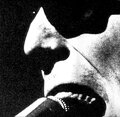 The Wolfman
Robert Ashley
The Wolfman
Robert AshleyRelated Press & Org Literature
 Source: Music Of The Avant Garde Issue Number 01
Source: Music of the Avant Garde
Source: Music Of The Avant Garde Issue Number 01
Source: Music of the Avant Garde Source: Music Of The Avant Garde Issue Number 02
Source: Music of the Avant Garde
Source: Music Of The Avant Garde Issue Number 02
Source: Music of the Avant Garde Source: Music Of The Avant Garde Issue Number 03
Source: Music of the Avant Garde
Source: Music Of The Avant Garde Issue Number 03
Source: Music of the Avant Garde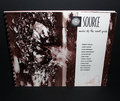 Source: Music Of The Avant Garde Issue Number 04 (with 2x10")
Source: Music of the Avant Garde
Source: Music Of The Avant Garde Issue Number 04 (with 2x10")
Source: Music of the Avant Garde Source: Music Of The Avant Garde Issue Number 05
Source: Music of the Avant Garde
Source: Music Of The Avant Garde Issue Number 05
Source: Music of the Avant Garde Source: Music of the Avant Garde Issue Number 06
Source: Music of the Avant Garde
Source: Music of the Avant Garde Issue Number 06
Source: Music of the Avant Garde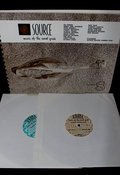 Source: Music Of The Avant Garde Issue Number 07 / 08 (with 2x10")
Source: Music of the Avant Garde
Source: Music Of The Avant Garde Issue Number 07 / 08 (with 2x10")
Source: Music of the Avant Garde Source: Music Of The Avant Garde Issue Number 09 (with 2x10")
Source: Music of the Avant Garde
Source: Music Of The Avant Garde Issue Number 09 (with 2x10")
Source: Music of the Avant Garde Source: Music Of The Avant Garde Issue Number 10
Source: Music of the Avant Garde
Source: Music Of The Avant Garde Issue Number 10
Source: Music of the Avant Garde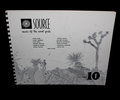 Source: Music Of The Avant Garde Issue Number 10
Source: Music of the Avant Garde
Source: Music Of The Avant Garde Issue Number 10
Source: Music of the Avant Garde Source: Music Of The Avant Garde Issue Number 11
Source: Music of the Avant Garde
Source: Music Of The Avant Garde Issue Number 11
Source: Music of the Avant Garde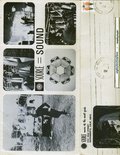 Source: Music of the Avant Garde Promo to Issue Number 4-10
Source: Music of the Avant Garde
Source: Music of the Avant Garde Promo to Issue Number 4-10
Source: Music of the Avant Garde
